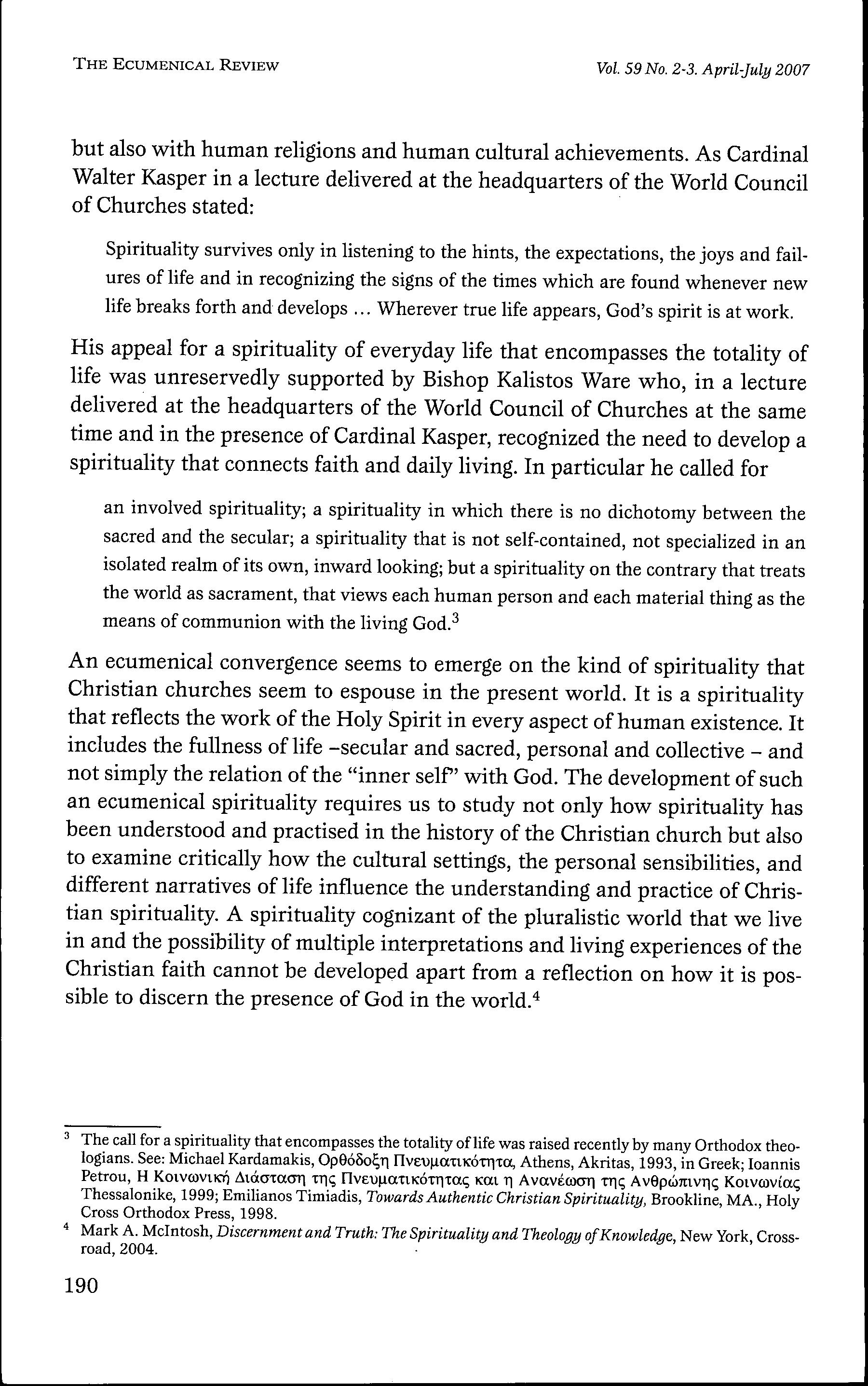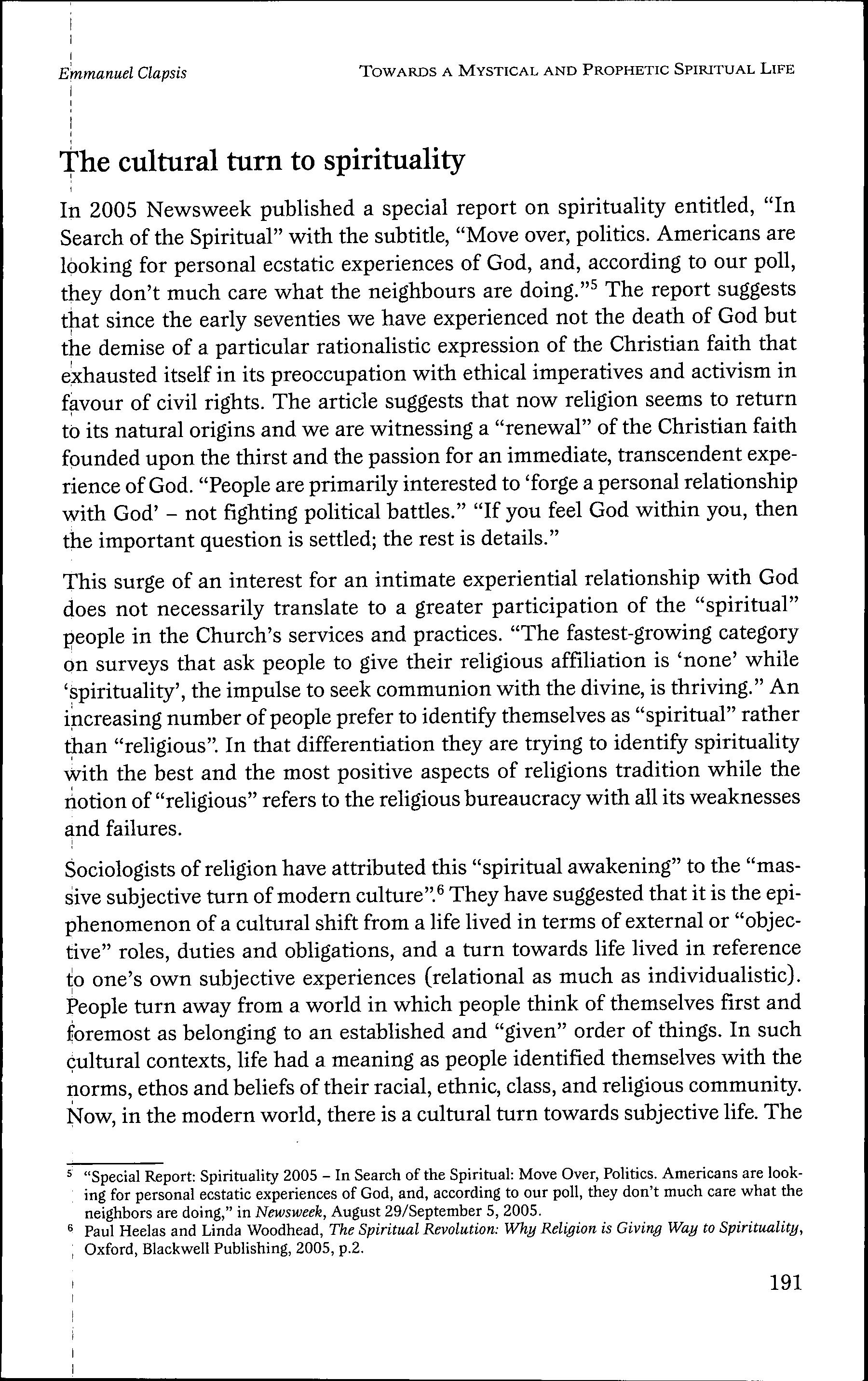The cultural turn to spirituality
In 2005 Newsweek published a special report on spirituality entitled, "In Search of the Spiritual" with the subtitle, "Move over, politics. Americans are looking for personal ecstatic experiences of God, and, according to our poll, they don't much care what the neighbours are doing."^ The report suggests that since the early seventies we have experienced not the death of God but the demise of a particular rationalistic expression of the Christian faith that exhausted itself in its preoccupation with ethical imperatives and activism in favour of civil rights. The article suggests that now religion seems to return to its natural origins and we are witnessing a "renewal" of the Christian faith founded upon the thirst and the passion for an immediate, transcendent experience of God. "People are primarily interested to 'forge a personal relationship with God' - not fighting political battles." "If you feel God within you, then the important question is settled; the rest is details."
This surge of an interest for an intimate experiential relationship with God does not necessarily translate to a greater participation of the "spiritual" people in the Church's services and practices. "The fastest-growing category on surveys that ask people to give their religious affiliation is 'none' while 'spirituality', the impulse to seek communion with the divine, is thriving." An increasing number of people prefer to identify themselves as "spiritual" rather than "religious". In that differentiation they are trying to identify spirituality With the best and the most positive aspects of religions tradition while the riotion of "religious" refers to the religious bureaucracy with all its weaknesses and failures.
Sociologists of religion have attributed this "spiritual awakening" to the "massive subjective turn of modern culture".** They have suggested that it is the epiphenomenon of a cultural shift from a life lived in terms of external or "objective" roles, duties and obligations, and a turn towards life lived in reference ip one's own subjective experiences (relational as much as individualistic). People turn away from a world in which people think of themselvesfirstand foremost as belonging to an established and "given" order of things. In such cultural contexts, life had a meaning as people identified themselves with the norms, ethos and beliefs of their racial, ethnic, class, and religious community. Now, in the modern world, there is a cultural turn towards subjective life. The
"Special Report: Spirituality 2005 - In Search of the Spiritual: Move Over, Politics Americans are looking for personal ecstatic experiences of God, and, according to our poll, they don't much care what the neighbors are doing," in Newsweek, August 29/September 5, 2005 Paul Heelas and Linda Woodhead, The Spiritual Revolution: Why Religion is Giving Way to Spirituality, Oxford, Blackwell Publishing, 2005, p.2
Emmanuel Clapsis TOWARDS A MYSTICAL AND PROPHETIC SPIRITUAL LIFE
191
suhjectivities of each individual (states of consciousness, memories, emotions, passions, hodily experiences, dreams, feelings, and sentiments) become a, if not the, unique source of significance, meaning and authority. Here the "good life" consists in living one's hfe in full awareness of one's states of heing, in enriching one's experience. The goal is not to follow established paths but to forge one's own inner-directed, as subjective, hfe. Not to become what others want one to be, but to "become who I truly am."
The differentiation of "hfe-as" and "suhjective-life" is helpful in understanding the rejection of religion and the preference for spirituality that marks modern religious sensibihties. It identifies hfe-as with religion and suhjectivelife with spirituahty. The former sacralizes "life-as", and by contrast, the latter sacralizes "suhjective-hfe". Empirical studies have shown that "those forms of religion that tell their followers to live their lives in conformity with external principles to the neglect of the cultivation of their unique suhjective-lives will he in decline ... By contrast, those forms of spirituality ... that help people to live in accordance with the deepest, sacred dimension of their own unique lives can he expected to be growing.'"' Alan Wolfe in his book on the transformation of American religion unequivocally states that all religious communities in America despite their divergence are facing the "same imperative: Personalize or die."^
The quest to understand the social realities that affect the cultural turn to the suhject and the pre-eminence that spirituality assumes over religion must grapple also with the effects of the consumer culture and market mentality upon every aspect of our personal and communal life. Instrumental rationality has inevitably led to the commodification of culture and even of spirituality.^ Commodification fragments elements of religious traditions into discrete, free-floating signifiers abstracted from their interconnection with doctrines, symbols and practices. This abstraction weakens their ability to impact the concrete practice of daily life and deprives them of their coherence within a hroader network of beliefs, and thus they are more readily put to other uses. They are reduced to shallow signifiers of whatever religious sentiment people desire. For example in modern societies, an individuahst/consumerist spirituality has emerged that embraces capitalism, consumerism, and individualism.
Paul Heelas and Linda Woodhead, The Spiritual Revolution: Why Religion is Giving Way to Spirituality Oxford, Blackwell Publishing, 2005, p.9
Alan Wolf, The Transformation of American Religion: How we actually Live our Faith, New York Free Press, 2003, p.35
VincentJ Miller, Consuming Religion: Christian Faith, and Practice in a Consumer Culture, New York, The Continuum, 2004
192
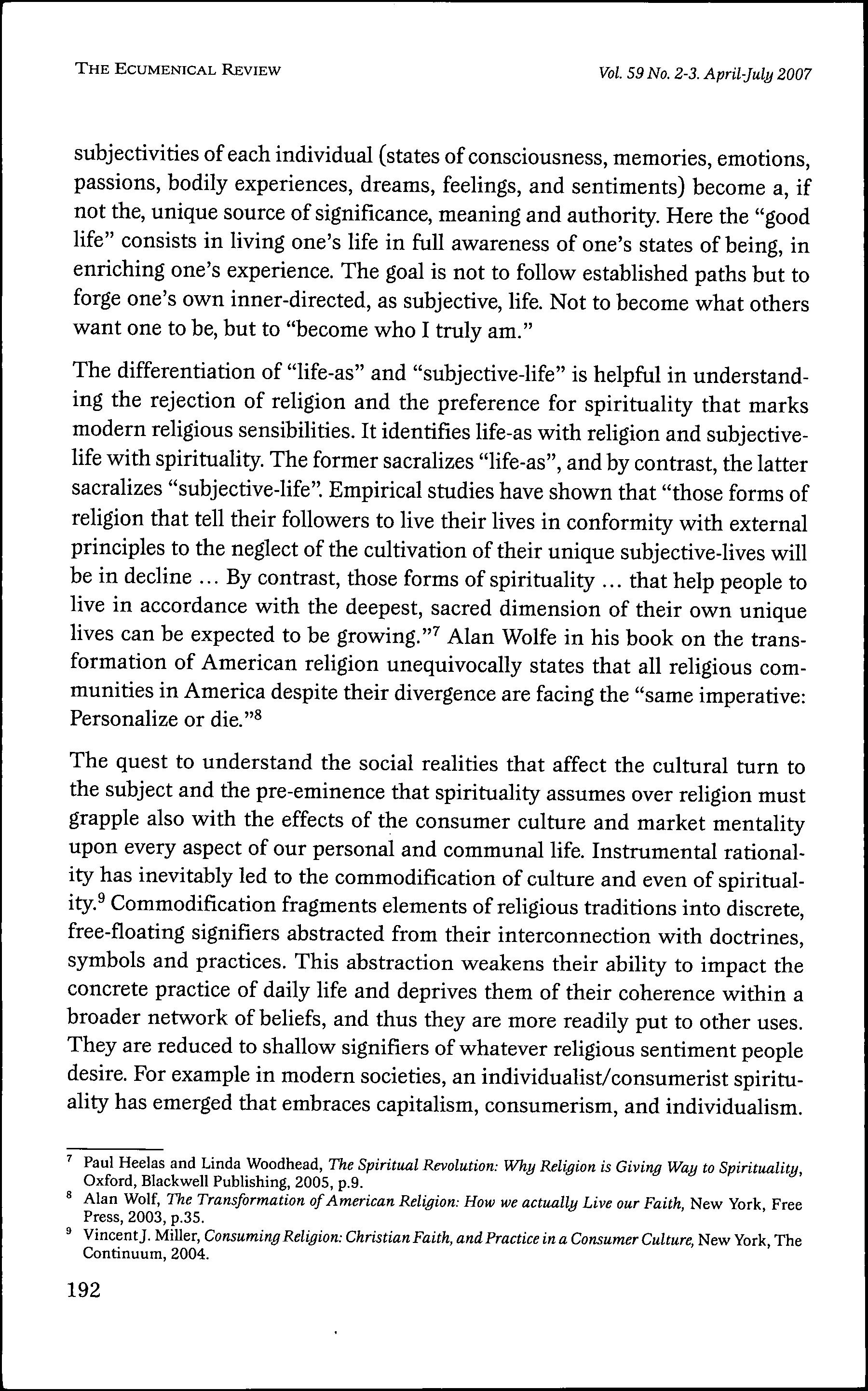
TH E ECUMENICAL REVIEW Vol. 59 No. 2-3. April-July 2007
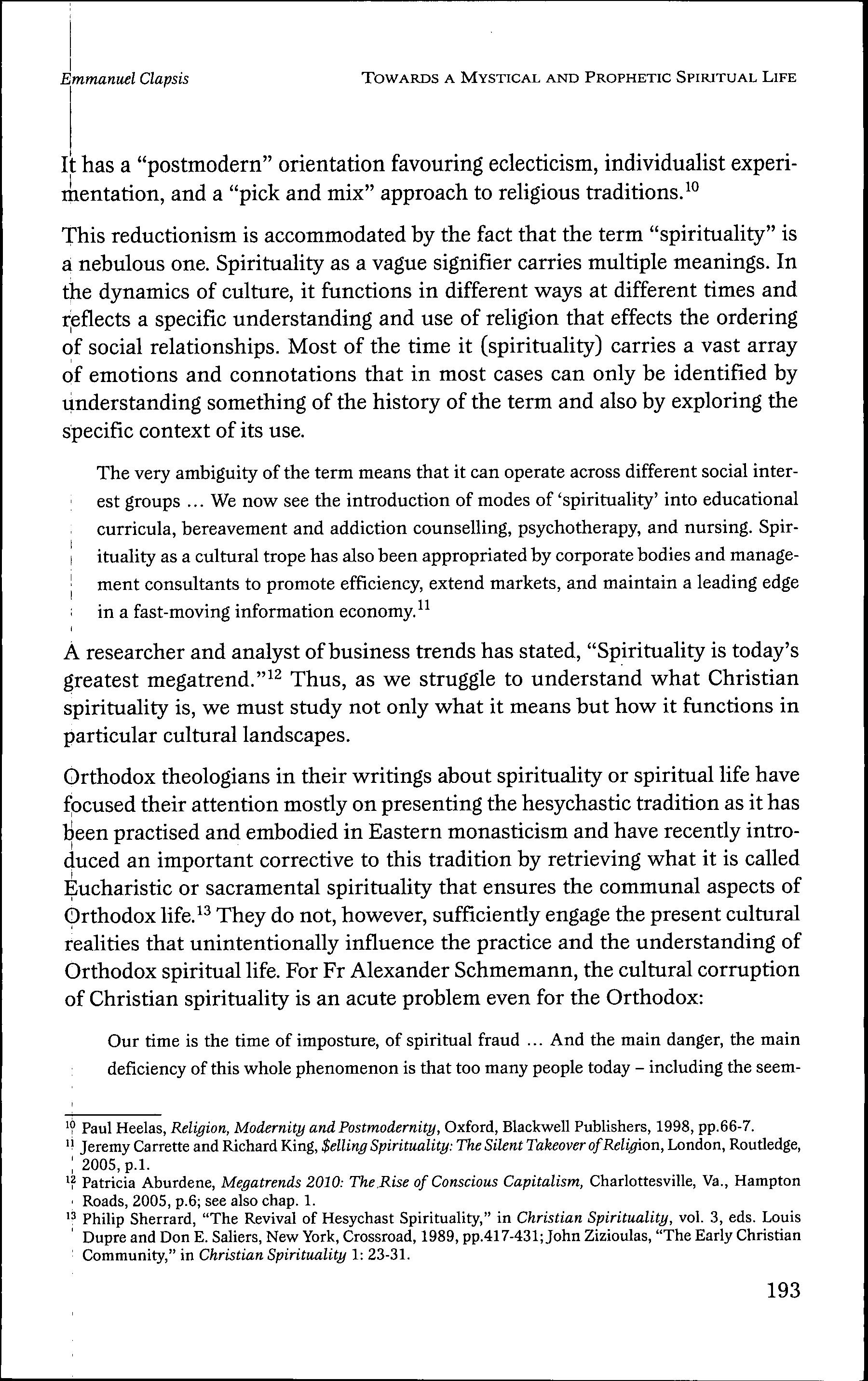
It has a "postmodern" orientation favouring eclecticism, individualist experimentation, and a "pick and mix" approach to religious traditions ^°
This reductionism is accommodated by the fact that the term "spirituality" is a nebulous one. Spirituality as a vague signifier carries multiple meanings. In the dynamics of culture, it functions in different ways at different times and reflects a specific understanding and use of religion that effects the ordering of social relationships. Most of the time it (spirituality) carries a vast array of emotions and connotations that in most cases can only be identified by understanding something of the history of the term and also by exploring the specific context of its use.
The very ambiguity of the term means that it can operate across different social interest groups ... We now see the introduction of modes of 'spirituahty' into educational curricula, bereavement and addiction counselling, psychotherapy, and nursing SpirI ituality as a cultural trope has also been appropriated by corporate bodies and manage'• ment consultants to promote efficiency, extend markets, and maintain a leading edge ; in a fast-moving information economy ^^
A researcher and analyst of business trends has stated, "Spirituality is today's greatest megatrend. "^^ Thus, as we struggle to understand what Christian spirituality is, we must study not only what it means but how it functions in particular cultural landscapes.
Orthodox theologians in their writings about spirituality or spiritual life have fpcused their attention mostly on presenting the hesychastic tradition as it has lieen practised and embodied in Eastern monasticism and have recently introduced an important corrective to this tradition by retrieving what it is called Eucharistic or sacramental spirituality that ensures the communal aspects of Orthodox life.^^ They do not, however, sufficiently engage the present cultural realities that unintentionally infiuence the practice and the understanding of Orthodox spiritual life. For Fr Alexander Schmemann, the cultural corruption of Christian spirituality is an acute problem even for the Orthodox:
Our time is the time of imposture, of spiritual fraud ... And the main danger, the main deficiency of this whole phenomenon is that too many people today - including the seem-
'? Paul Heelas, Religion, Modernity and Postmodernity, Oxford, Blackwell Publishers, 1998, pp.66-7.
'! Jeremy Carrette and Richard King, Selling Spirituality: The Silent Takeover ofReligion, London, RouUedge, I 2005, p.L
'? Patricia Aburdene, Megatrends 2010: The Rise of Conscious Capitalism, Charlottesville, Va., Hampton ' Roads, 2005, p.6; see also chap 1
'^ Philip Sherrard, "The Revival of Hesychast Spirituality," in Christian Spirituality, vol 3, eds Louis Dupre and Don E Saliers, New York, Crossroad, 1989, pp.417-431; John Zizioulas, "The Early Christian Community," in Christian Spirituality 1: 23-31
Emmanuel Clapsis TOWARDS A MYSTICAL AND PROPHETIC SPIRITUAL LIFE
193
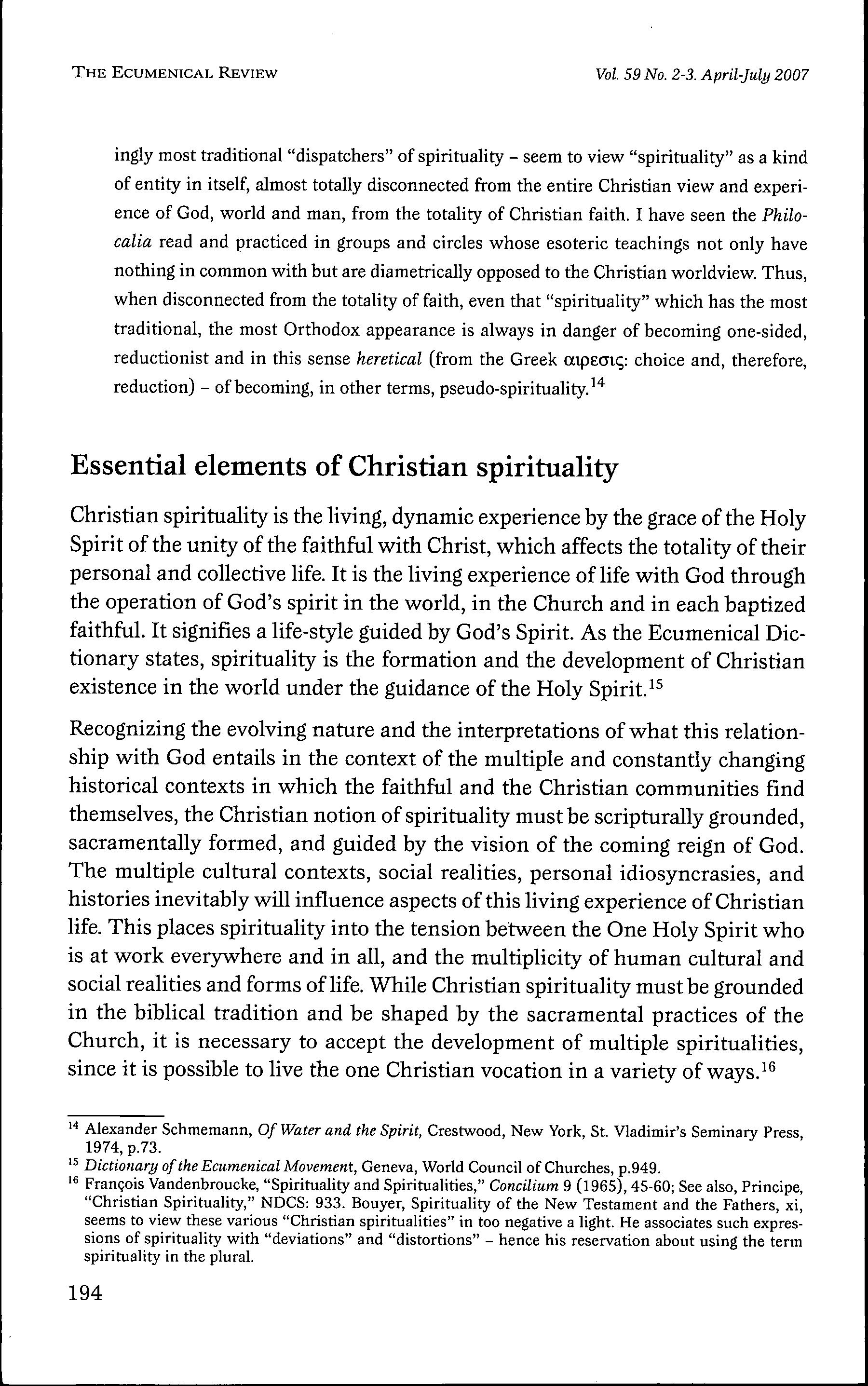
ingly most traditional "dispatchers" of spirituality - seem to view "spirituality" as a kind of entity in itself, almost totally disconnected from the entire Christian view and experience of God, world and man, from the totality of Christian faith. I have seen the Philocalia read and practiced in groups and circles whose esoteric teachings not only have nothing in common with but are diametrically opposed to the Christian worldview. Thus, when disconnected from the totality of faith, even that "spirituality" which has the most traditional, the most Orthodox appearance is always in danger of becoming one-sided, reductionist and in this sense heretical (from the Greek aipeovq: choice and, therefore, reduction) - of becoming, in other terms, pseudo-spirituality.^'*
Essential elements of Christian spirituality
Christian spirituality is the living, dynamic experience by the grace of the Holy Spirit of the unity of the faithful with Christ, which affects the totality of their personal and collective life. It is the living experience of life with God through the operation of God's spirit in the world, in the Church and in each baptized faithful. It signifies a life-style guided by God's Spirit. As the Ecumenical Dictionary states, spirituality is the formation and the development of Christian existence in the world under the guidance of the Holy Spirit. ^^
Recognizing the evolving nature and the interpretations of what this relationship with God entails in the context of the multiple and constantly changing historical contexts in which the faithful and the Christian communities find themselves, the Christian notion of spirituality must be scripturally grounded, sacramentally formed, and guided by the vision of the coming reign of God. The multiple cultural contexts, social realities, personal idiosyncrasies, and histories inevitably will influence aspects of this living experience of Christian life. This places spirituality into the tension between the One Holy Spirit who is at work everywhere and in all, and the multiplicity of human cultural and social realities and forms of life. While Christian spirituality must be grounded in the biblical tradition and be shaped by the sacramental practices of the Church, it is necessary to accept tbe development of multiple spiritualities, since it is possible to live the one Christian vocation in a variety of ways. ^^
" Alexander Schmemann, Of Water and the Spirit, Crestwood, New York, St Vladimir's Seminary Press 1974, p,73
'^ Dictionary of the Ecumenical Movement, Geneva, World Council of Churches, p.949
'^ Frangois Vandenbroucke, "Spirituality and Spiritualities," Concilium 9 (1965), 45-60; See also, Principe, "Christian Spirituality," NDCS: 933 Bouyer, Spirituality of the New Testament and the Fathers, xi, seems to view these various "Christian spiritualities" in too negative a light He associates such expressions of spirituality with "deviations" and "distortions" - hence his reservation about using the term spirituality in the plural
TH E ECUMENICAL REVIEW Vol. 59 No. 2-3. April-July 2007
194
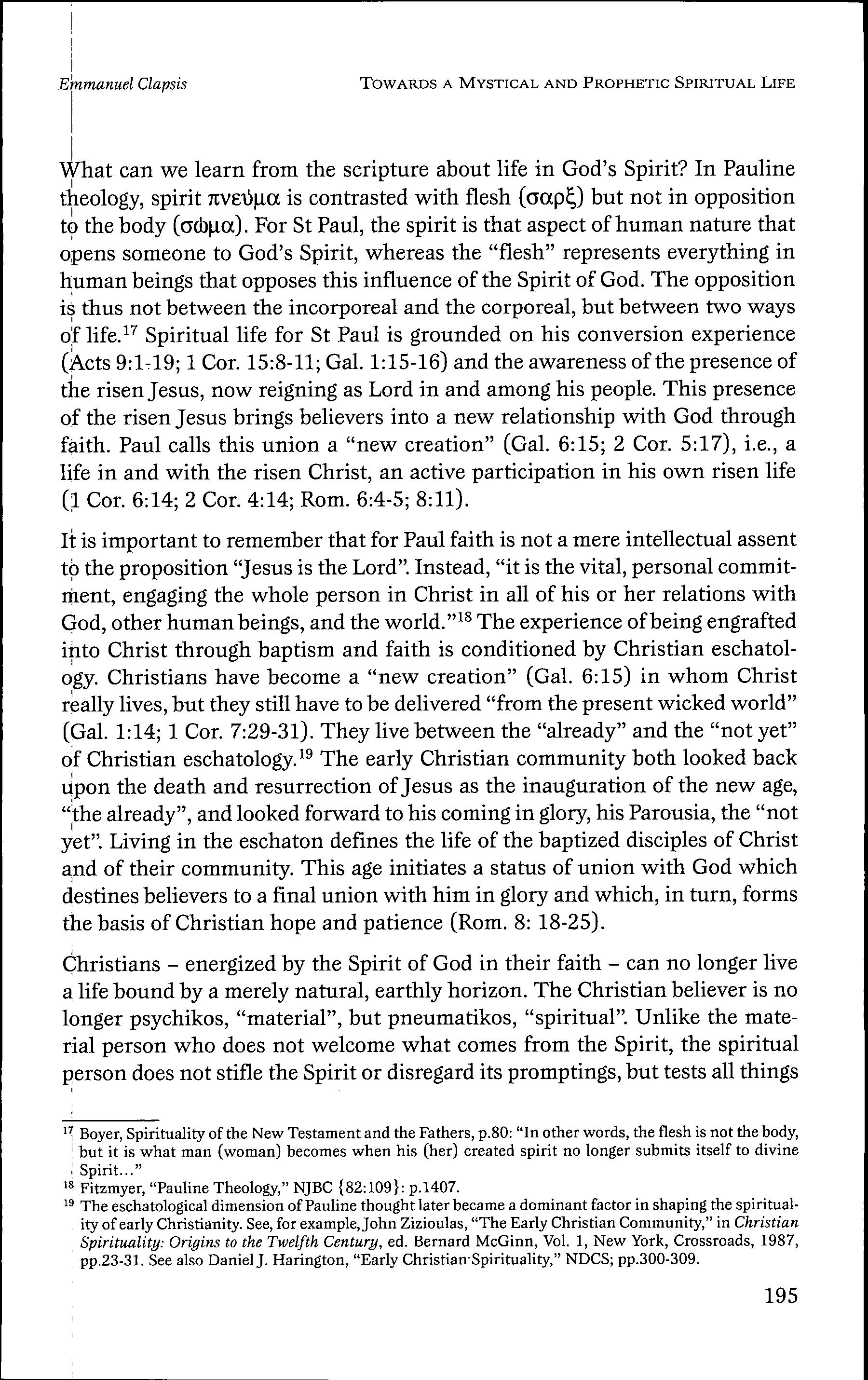
What can we learn from the scripture ahout life in God's Spirit? In Pauline theology, spirit 7ive\I)|ua is contrasted with flesh (aap ^ hut not in opposition to the hody (o(l)|ia). For St Paul, the spirit is that aspect of human nature that opens someone to God's Spirit, whereas the "flesh" represents everything in lluman beings that opposes this influence of the Spirit of God. The opposition is thus not hetween the incorporeal and the corporeal, but between two ways of life.^'^ Spiritual life for St Paul is grounded on his conversion experience (Acts 9:1-19; 1 Cor. 15:8-11; Gal. 1:15-16) and the awareness of the presence of the risen Jesus, now reigning as Lord in and among his people. This presence of the risen Jesus brings believers into a new relationship with God through faith. Paul calls this union a "new creation" (Gal. 6:15; 2 Cor. 5:17), i.e., a life in and with the risen Christ, an active participation in his own risen life (1 Cor. 6:14; 2 Cor. 4:14; Rom. 6:4-5; 8:11).
It is important to remember that for Paul faith is not a mere intellectual assent to the proposition "Jesus is the Lord". Instead, "it is the vital, personal commitment, engaging the whole person in Christ in all of his or her relations with God, other human heings, and the world."^^ The experience ofbeing engrafted iiito Christ through baptism and faith is conditioned by Christian eschatology Christians have become a "new creation" (Gal 6:15) in whom Christ really lives, but they still have to be delivered "from the present wicked world" (Gal. 1:14; 1 Cor. 7:29-31). They live between the "already" and the "not yet" of Christian eschatology.^^ The early Christian community both looked back Upon the death and resurrection of Jesus as the inauguration of the new age, "|the already", and looked forward to his coming in glory, his Parousia, the "not yet". Living in the eschaton defines the life of the baptized disciples of Christ and of their community. This age initiates a status of union with God which destines believers to a final union with him in glory and which, in turn, forms the hasis of Christian hope and patience (Rom. 8: 18-25).
Christians - energized by the Spirit of God in their faith - can no longer live a life bound by a merely natural, earthly horizon. The Christian believer is no longer psychikos, "material", but pneumatikos, "spiritual". Unlike the material person who does not welcome what comes from the Spirit, the spiritual person does not stifle the Spirit or disregard its promptings, but tests all things
"I Boyer, Spirituality of the New Testament and the Fathers, p.8O: "In other words, the flesh is not the body, but it is what man (woman) becomes when his (her) created spirit no longer submits itself to divine : Spirit..."
'^ Fitzmyer, "Pauline Theology," NJBC {82:109}: p.l407
^' The eschatological dimension of Pauline thought later became a dominant factor in shaping the spirituality of early Christianity. See, for example, John Zizioulas, "The Early Christian Community," in Christian Spirituality: Origins to the Twelfth Century, ed. Bernard McGinn, Vol. 1, New York, Crossroads, 1987, pp.23-31. See also Daniel J. Harington, "Early Christian Spirituality," NDCS; pp.300-309.
Emmanuel Clapsis TOWARDS A MYSTICAL AND PROPHETIC SPIRITUAL LIFE
195
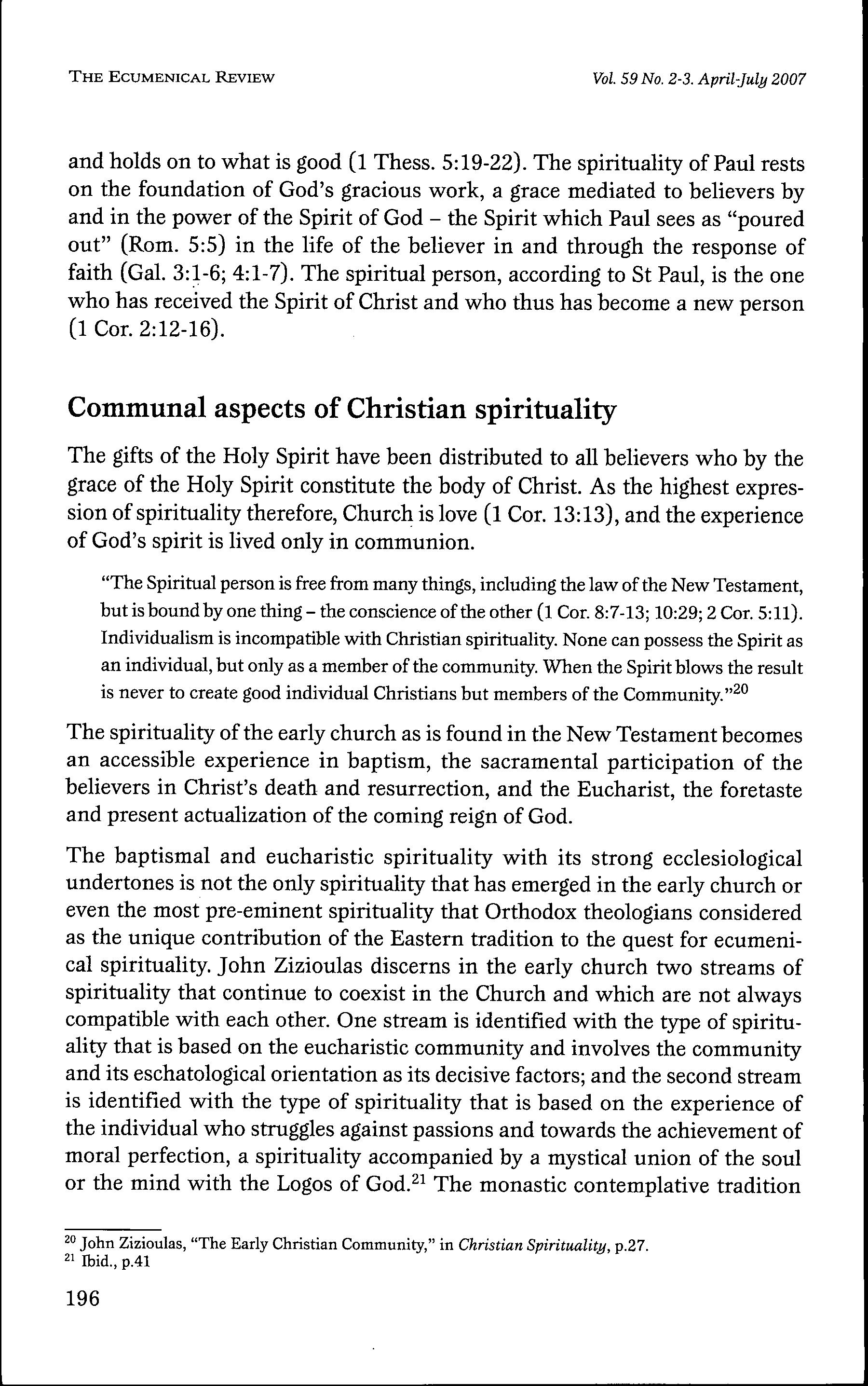
and holds on to what is good (1 Thess. 5:19-22). The spirituality of Paul rests on the foundation of God's gracious work, a grace mediated to believers by and in tbe power of tbe Spirit of God - tbe Spirit wbicb Paul sees as "poured out" {Rom. 5:5) in tbe life of tbe believer in and tbrougb tbe response of faitb {Gal. 3:1-6; 4:1-7). Tbe spiritual person, according to St Paul, is tbe one wbo bas received tbe Spirit of Cbrist and wbo tbus bas become a new person {1 Cor. 2:12-16).
Communal aspects of Christian spirituality
Tbe gifts of tbe Holy Spirit bave been distributed to all believers wbo by tbe grace of tbe Holy Spirit constitute tbe body of Cbrist. As tbe bigbest expression of spirituality tberefore, Cburcb is love {1 Cor. 13:13), and tbe experience of God's spirit is lived only in communion.
"The Spiritual person is free from many things, including the law of the New Testament, but is bound by one thing - the conscience of the other (l Cor. 8:7-13; 10:29; 2 Cor. 5:11).
Individualism is incompatible with Christian spirituality None can possess the Spirit as an individual, but only as a member of the community. When the Spirit blows the result is never to create good individual Christians but members of the Community."^"
Tbe spirituality of the early cburcb as is found in tbe New Testament becomes an accessible experience in baptism, the sacramental participation of tbe believers in Cbrist's deatb and resurrection, and the Eucharist, tbe foretaste and present actualization of tbe coming reign of God
Tbe baptismal and eucbaristic spirituality witb its strong ecclesiological undertones is not tbe only spirituality tbat bas emerged in tbe early cburcb or even tbe most pre-eminent spirituality tbat Ortbodox tbeologians considered as tbe unique contribution of tbe Eastern tradition to tbe quest for ecumenical spirituality. Jobn Zizioulas discerns in tbe early cburcb two streams of spirituality tbat continue to coexist in tbe Cburcb and wbicb are not always compatible with each other. One stream is identified witb the type of spirituality that is based on the eucharistic community and involves the community and its eschatological orientation as its decisive factors; and the second stream is identified with tbe type of spirituality tbat is based on the experience of the individual wbo struggles against passions and towards tbe acbievement of moral perfection, a spirituality accompanied by a mystical union of tbe soul or tbe mind witb tbe Logos of God.^^ Tbe monastic contemplative tradition
2" John Zizioulas, "The Early Christian Community," in Christian Spirituality, p.27 21 Ibid., p.41
THE ECUMENICAL REVIEW Vol. 59 No. 2-3. April-July 2007
196
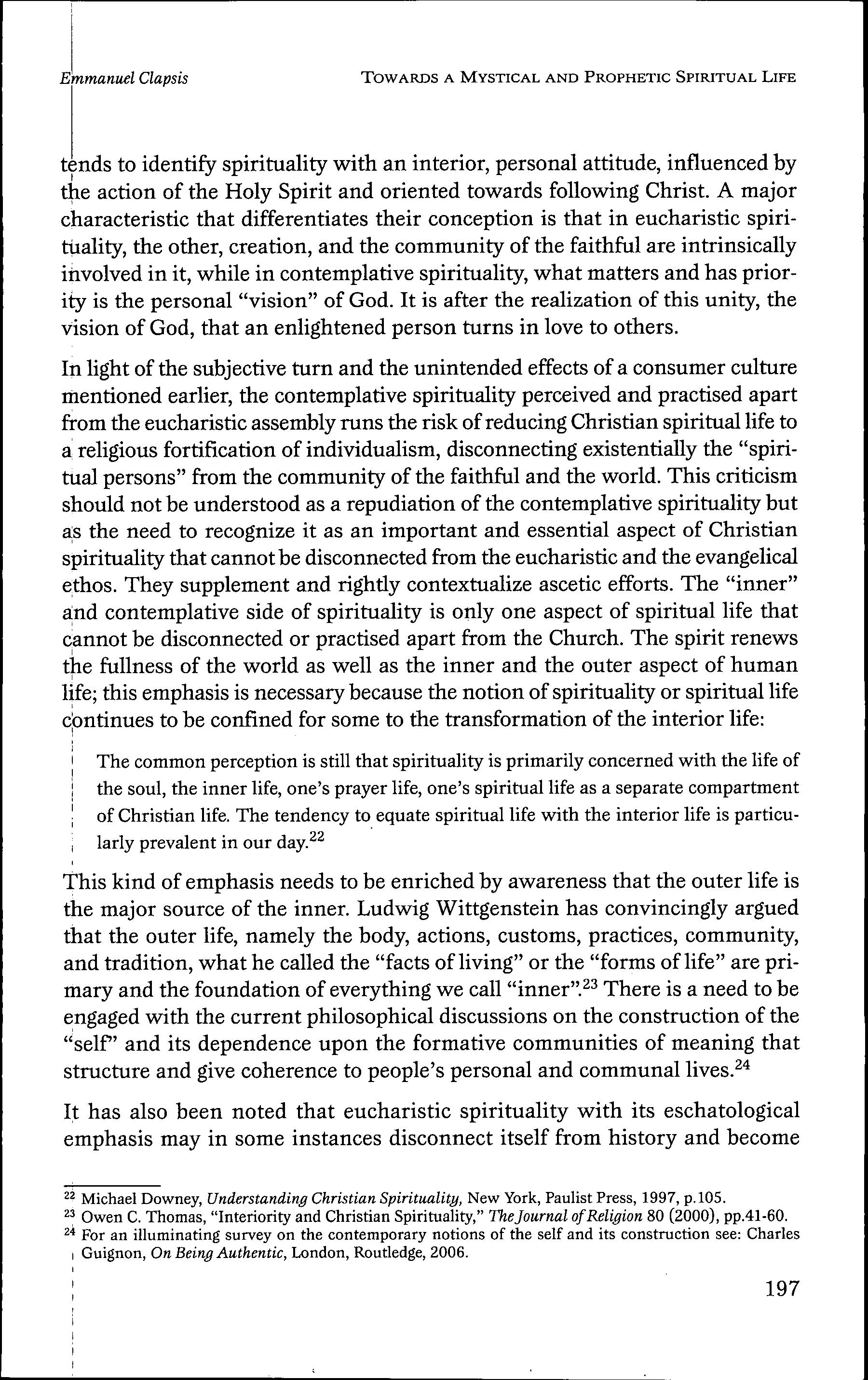
tends to identify spirituality with an interior, personal attitude, influenced hy the action of the Holy Spirit and oriented towards following Christ. A major characteristic that differentiates their conception is that in eucharistic spiritiiality, the other, creation, and the community of the faithful are intrinsically itivolved in it, while in contemplative spirituality, what matters and has priority is the personal "vision" of God. It is after the realization of this unity, the vision of God, that an enlightened person turns in love to others.
In light of the suhjective turn and the unintended effects of a consumer culture mentioned earlier, the contemplative spirituality perceived and practised apart from the eucharistic assemhly runs the risk of reducing Christian spiritual life to a religious fortification of individualism, disconnecting existentiaUy the "spiritual persons" from the community of the faithful and the world. This criticism should not he understood as a repudiation of the contemplative spirituality hut a:s the need to recognize it as an important and essential aspect of Christian spirituality that cannot he disconnected from the eucharistic and the evangelical ethos. They supplement and rightly contextualize ascetic efforts. The "inner" and contemplative side of spirituality is only one aspect of spiritual life that cannot he disconnected or practised apart from the Church The spirit renews the fullness of the world as well as the inner and the outer aspect of human life; this emphasis is necessary hecause the notion of spirituality or spiritual life c|ontinues to he confined for some to the transformation of the interior life:
i The common perception is still that spirituality is primarily concerned with the life of I the soul, the inner life, one's prayer life, one's spiritual life as a separate compartment \ of Christian life. The tendency to equate spiritual life with the interior life is particuI larly prevalent in our day.^^
This kind of emphasis needs to he enriched hy awareness that the outer life is the major source of the inner. Ludwig Wittgenstein has convincingly argued that the outer life, namely the hody, actions, customs, practices, community, and tradition, what he called the "facts of living" or the "forms of life" are primary and the foundation of everything we call "inner".^-^ There is a need to he engaged with the current philosophical discussions on the construction of the "self and its dependence upon the formative communities of meaning that structure and give coherence to people's personal and communal lives.^*
It has also heen noted that eucharistic spirituality with its eschatological emphasis may in some instances disconnect itself from history and hecome
22 Michael Downey, Understanding Christian Spirituality, New York, Paulist Press, 1997, p.lO5.
2^ Owen C. Thomas, "Interiority and Christian Spirituality," Thejournal ofReligion 80 (2000), pp.41-60.
^* For an illuminating survey on the contemporary notions of the self and its construction see: Charles I Guignon, On Being Authentic, London, Routledge, 2006
! 197
Emmanuel Clapsis TOWARDS A MYSTICAL AND PROPHETIC SPIRITUAL LIFE
indifferent to the need to manifest the newness in Christ through words and actions that reflect the spirit of what the Church and baptized Christians have become in Christ. The eschatological celebration of God's active presence in tbe world as it is experienced and lived in the Eucharist instead of becoming the basis of the Church's participation and involvement in God's continuing work for the transfiguration of tbe world - in some instances becomes a tbeological justification for escaping from bistory. Jobn Zizioulas repudiates tbis trend and acknowledges tbe need for tbe Ortbodox to draw tbe ethical implications of tbe Eucbarist Ortbodoxy subscribing to tbis trend risks undermining tbe mission and involvement of the Cburcb in history because it is satisfied "with a beautiful liturgy witbout bothering to draw its social and ethical implications. "^^ Alexander Scbmemann argues for the all-encompassing understanding of salvation, whicb is incompatible witb privatism, limiting itself into tbe safe space of sacramentalism. He states:
Salvation can never be an "escape", a mere negation, a self-righteous delectation in one's own "withdrawal" from the wicked world. We must not identify in a Gnostic manner the world with evil, the essence of things with their deviation from and betrayal of that essence, the ultimate cause with the broken and evil effects of that cause. It consists not simply in discerning the "good" from the "evil", but precisely in discerning the essential goodness of all that exists and acts, however broken and subdued to evil is its existence "The whole world hes in wickedness" (I John 5:19), but the world is not evil.^^
Tbe recognition of tbe essential goodness of tbe world is tbe foundation of tbe Cbristian joy and tbankfulness to God for all bis gifts and tbe ground for the Cbristian total involvement in tbe life of tbe world in an effort to make tbis goodness more transparent and real for all people.^''
Unity of love for God and the neighbour
A spiritual life reflective of tbe evangelical, liturgical and patristic etbos of the cburcb sbould reflect tbe inseparable unity between tbe love of God and love of tbe neigbbour. St Basil, reflecting on Jobn 13:34 ( "A new commandment I give to you, tbat you love one anotber") andJobn 13:35 ("By tbis all will know tbat you are my disciples, if you bave love for one another"), states that Jesus combines tbese two commandments in sucb a way tbat be assigns to bimself
^^ John Zizioulas, "Eschatology and History", in Cultures in Dialogue: Documents from a Symposium in Honor ofPhilip A. Potter, edited by T Wieser, Geneva, World Council of Churches, pp.38-39
2" Alexander Schmemann, Of Water and the Spirit, Crestwood, New York, St Vladimir's Seminary Press 1974, p.84
2^ Ibid
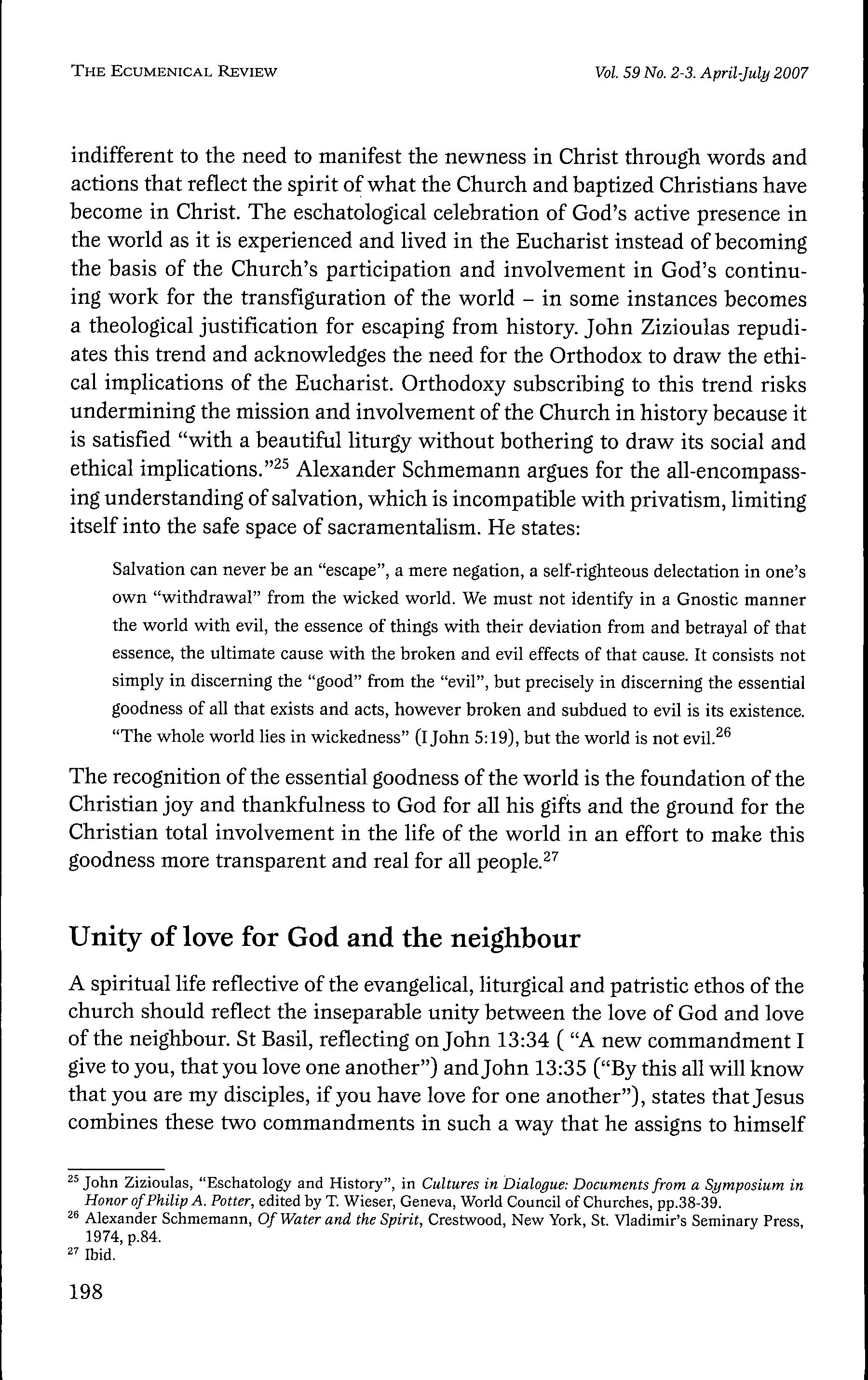
THE ECUMENICAL REVIEW Vol. 59 No. 2-3. April-July 2007
198
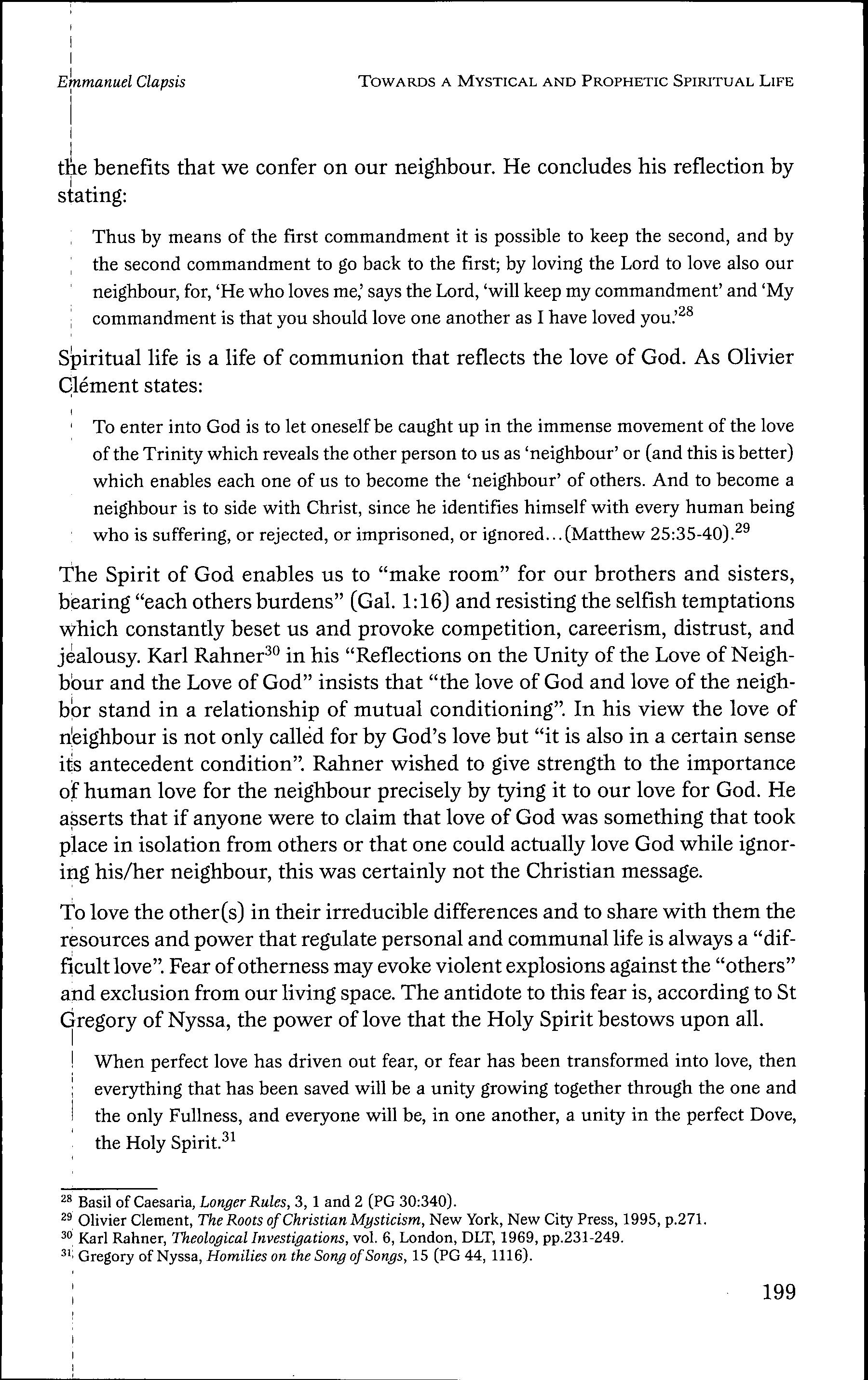
tie benefits that we confer on our neighbour. He concludes his reflection by stating:
Thus by means of the first commandment it is possihle to keep the second, and hy the second commandment to go hack to the first; hy loving the Lord to love also our neighhour, for, 'He who loves me,' says the Lord, 'will keep my commandment' and 'My commandment is that you should love one another as I have loved ^^
Spiritual life is a life of communion tbat reflects tbe love of God. As Olivier Clement states:
I ' To enter into God is to let oneself he caught up in the immense movement of the love of the Trinity which reveals the other person to us as 'neighbour' or (and this is better) which enahles each one of us to hecome the 'neighbour' of others And to become a neighbour is to side with Christ, since he identifies himself with every human being who is suffering, or rejected, or imprisoned, or ignored...(Matthew 25:35-40).^^
Tbe Spirit of God enables us to "make room" for our brotbers and sisters, bearing "eacb otbers burdens" (Gal. 1:16) and resisting tbe selfisb temptations wbicb constantly beset us and provoke competition, careerism, distrust, and jealousy. Karl Rabner^" in bis "Reflections on tbe Unity of tbe Love of Neigbbbur and the Love of God" insists that "the love of God and love of the neighbor stand in a relationsbip of mutual conditioning". In bis view tbe love of n|eigbbour is not only called for by God's love but "it is also in a certain sense itis antecedent condition". Rabner wisbed to give strengtb to tbe importance of buman love for tbe neigbbour precisely by tying it to our love for God. He asserts tbat if anyone were to claim tbat love of God was sometbing tbat took place in isolation from otbers or tbat one could actually love God wbile ignoring his/ber neigbbour, tbis was certainly not tbe Cbristian message.
To love tbe otber(s) in tbeir irreducible differences and to sbare witb tbem tbe resources and power tbat regulate personal and communal life is always a "difficult love". Fear of otberness may evoke violent explosions against tbe "otbers" and exclusion from our living space. Tbe antidote to tbis fear is, according to St Gregory of Nyssa, tbe power of love tbat tbe Holy Spirit bestows upon all.
! When perfect love has driven out fear, or fear has been transformed into love, then everything that has heen saved will be a unity growing together through the one and the only Fullness, and everyone will be, in one another, a unity in the perfect Dove, the Holy ^^
8 Basil of Caesaria, Longer Rules, 3, 1 and 2 (PG 30:340)
5 Olivier Clement, The Roots of Christian Mysticism, New York, New City Press, 1995, p.271
" Karl Rahner, Theological Investigations, vol 6, London, DLT, 1969, pp.231-249
i; Gregory of Nyssa, Homilies on the Song of Songs, 15 (PG 44, 1116)
Emmanuel Clapsis TOWARDS A MYSTICAL AND PROPHETIC SPIRITUAL LIFE
199
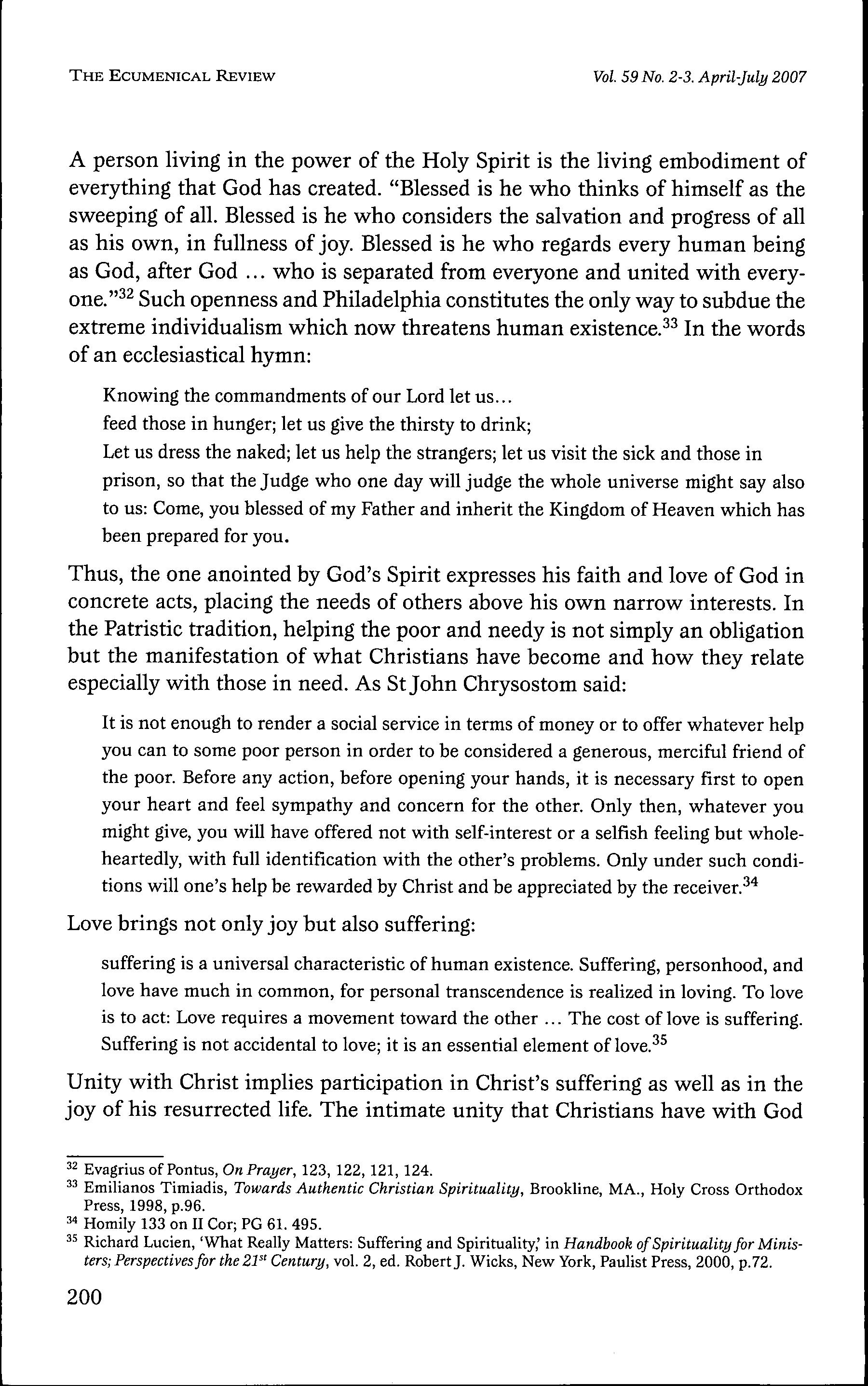
A person living in the power of the Holy Spirit is the living embodiment of everything that God has created. "Blessed is he who thinks of himself as the sweeping of all. Blessed is he who considers the salvation and progress of all as his own, in fullness of joy. Blessed is he who regards every human being as God, after God ... who is separated from everyone and united with everyone "^^ Such openness and Philadelphia constitutes the only way to subdue the extreme individualism which now threatens human existence.^^ In the words of an ecclesiastical hymn:
Knowing the commandments of our Lord let us.. feed those in hunger; let us give the thirsty to drink; Let us dress the naked; let us help the strangers; let us visit the sick and those in prison, so that the Judge who one day will judge the whole universe might say also to us: Come, you blessed of my Father and inherit the Kingdom of Heaven which has heen prepared for you
Thus, tbe one anointed by God's Spirit expresses his faitb and love of God in concrete acts, placing the needs of otbers above bis own narrow interests. In tbe Patristic tradition, belping tbe poor and needy is not simply an obligation but tbe manifestation of wbat Cbristians bave become and bow tbey relate especially witb tbose in need As St Jobn Cbrysostom said:
It is not enough to render a social service in terms of money or to offer whatever help you can to some poor person in order to be considered a generous, merciful friend of the poor Before any action, before opening your hands, it is necessary first to open your heart and feel sympathy and concern for the other. Only then, whatever you might give, you will have offered not with self-interest or a selfish feeling but wholeheartedly, with full identification with the other's problems. Only under such conditions will one's help be rewarded by Christ and be appreciated by the receiver.^*
Love brings not only joy but also suffering:
suffering is a universal characteristic of human existence. Suffering, personhood, and love have much in common, for personal transcendence is realized in loving. To love is to act: Love requires a movement toward the other ... The cost of love is suffering. Suffering is not accidental to love; it is an essential element of love.^^
Unity witb Cbrist implies participation in Cbrist's suffering as well as in tbe joy of bis resurrected life. Tbe intimate unity tbat Cbristians bave with God
Evagriusof Pontus, On Prayer, 123, 122, 121, 124
Emilianos Timiadis, Towards Authentic Christian Spirituality, Brookline, MA., Holy Cross Orthodox Press, 1998, p.96
Homily 133 on II Cor; PG 61 495
Richard Lucien, 'What Really Matters: Suffering and Spirituality,' in Handbook of Spirituality for Ministers; Perspectivesfor the 21" Century, vol 2, ed Robert J Wicks, New York, Paulist Press, 2000, p.72
THE ECUMENICAL REVIEW Vol. 59 No. 2-3. April-July 2007
200
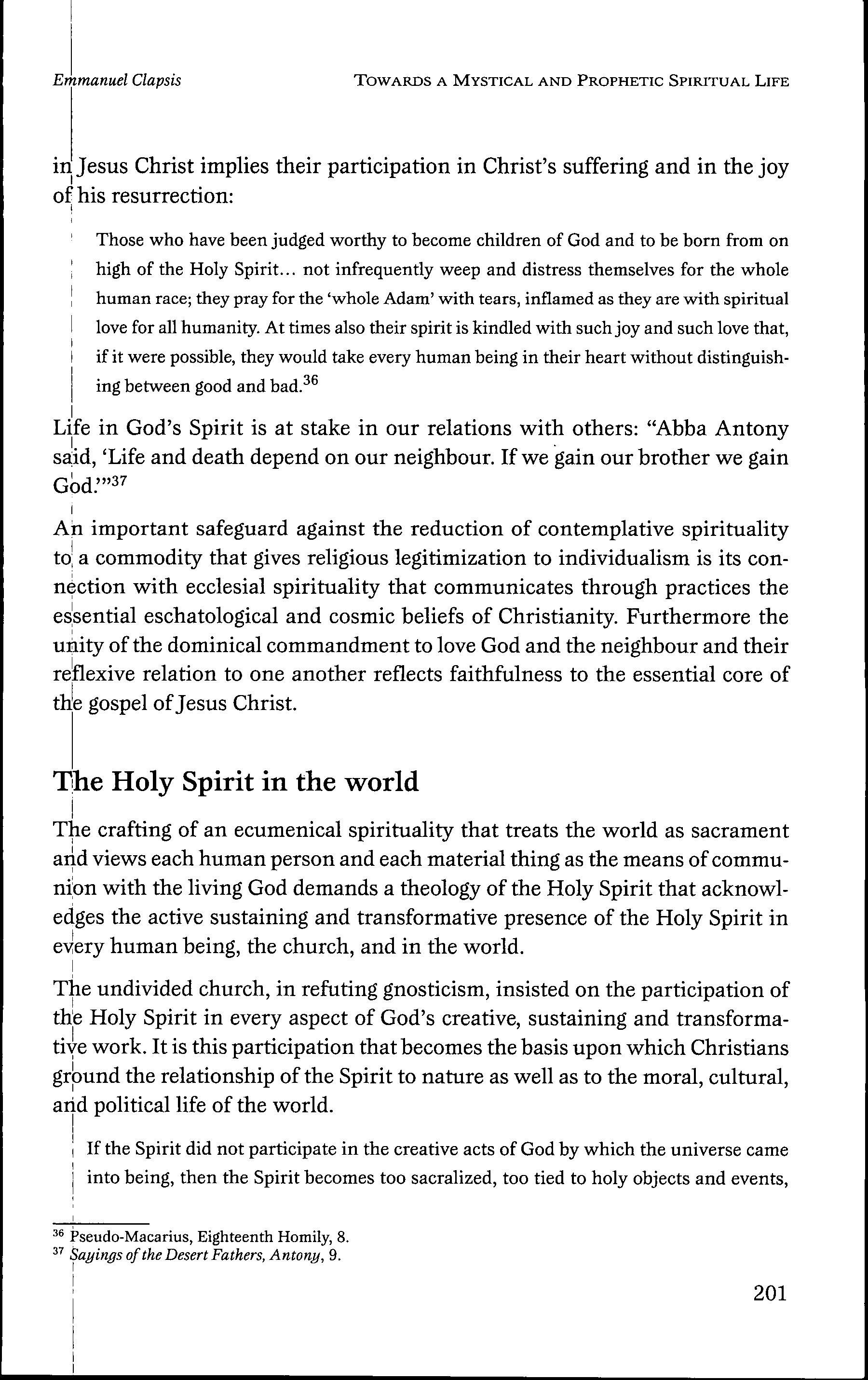
in Jesus Christ implies tbeir participation in Christ's suffering and in the joy of his resurrection:
' Those who have heen judged worthy to become children of God and to he horn from on \ high of the Holy Spirit.. not infrequently weep and distress themselves for the whole I human race; they pray for the 'whole Adam' with tears, inflamed as they are with spiritual love for all humanity At times also their spirit is kindled with such joy and such love that, if it were possible, they would take every human being in their heart without distinguishing between good and bad.^^
Life in God's Spirit is at stake in our relations with others: "Abba Antony sa:id, 'Life and death depend on our neighbour. If we gain our brotber we gain
An important safeguard against tbe reduction of contemplative spirituality to; a commodity tbat gives religious legitimization to individualism is its connection witb ecclesial spirituality tbat communicates tbrougb practices the essential escbatological and cosmic beliefs of Cbristianity. Furtbermore tbe unity of tbe dominical commandment to love God and tbe neigbbour and tbeir reflexive relation to one anotber reflects faithfulness to tbe essential core of the gospel ofJesus Christ.
The Holy Spirit in the world i
The crafting of an ecumenical spirituality that treats tbe world as sacrament and views eacb buman person and eacb material tbing as the means of communion with the living God demands a theology of the Holy Spirit that acknowledges the active sustaining and transformative presence of tbe Holy Spirit in every buman being, tbe cburcb, and in tbe world.
The undivided church, in refuting gnosticism, insisted on the participation of the Holy Spirit in every aspect of God's creative, sustaining and transformative work. It is this participation tbat becomes tbe basis upon wbich Christians ground the relationship of tbe Spirit to nature as well as to tbe moral, cultural, and political life of tbe world.
If the Spirit did not participate in the creative acts of God hy which the universe came into heing, then the Spirit hecomes too sacralized, too tied to holy ohjects and events.
Pseudo-Macarius, Eighteenth Homily, 8
Sayings of the Desert Fathers, Antony, 9
Emmanuel Clapsis TOWARDS A MYSTICAL AND PROPHETIC SPIRITUAL LIFE
201
and thus the life of the world apart or independent of the Church appears as void of God's presence.•^^
By affirming tbe active participation of tbe Spirit in God's creative and sustaining acts, we find God, tbrougb tbe Holy Spirit, to be actively present in tbe life of tbe wbole universe, a presence wbicb precedes tbe personal or particular operation of tbe Spirit tbrougb tbe prayer of tbe Cburcb Tbis understanding overcomes tbe subjective, privatizing view of tbe Spirit cbaracteristic of pietism, wbile it views positively tbe experiential dimension of pneumatology.
Tbe 9tb Assembly of tbe World Council of Cburcb beld in Canberra, Australia in 1993 provided an opportunity for tbe Cbristian cburcbes to reflect on bow tbe Holy Spirit sustains and transforms tbe world.^^ Tbe report of tbe Eastern Ortbodox and Oriental Ortbodox Consultation on tbe tbeme of tbe Assembly entitled "Come, Holy Spirit - Renew tbe Wbole Creation: An Ortbodox Approacb"^° provides, in my judgment, some important principles for tbe development of an understanding about tbe operation of tbe Holy Spirit in tbe totality of God's creation.
Tbe report maintains tbe need to recognize tbat tbe presence and tbe operation of tbe Holy Spirit in tbe world must not be seen apart from tbe work of Jesus Cbrist and tbe loving will of God tbe Father It stresses tbat the work of tbe Holy Spirit in creation and redemption aims at liberating bumanity and creation in general from all forms of self-sufficiency and "autonomy" vis-a-vis God. Tbe Spirit of God opens up tbe boundaries of wbatever be toucbes and brings it to relation witb tbe transcended God. It serves tbe will of God, wbo desires and actively works so tbat bumanity and creation in general will transcend its creaturely limitations and enter into tbe glory and life of God (Rom. 8:20-21).
Tbe transcending and liberating aspect of tbe work of tbe Holy Spirit sbows God to be tbe Spirit of communion (2 Cor. 13:13). Tbis is not only true witb reference to tbe relation between God and tbe world, but also witb regard to inter-buman relations and indeed to tbe relations of tbe buman being witb tbe wbole creation Wberever tbe Holy Spirit blows, tbe boundaries of individualism are transcended and love and communion emerge.
^^ Kilian McDonnell,"The Determinative Doctrine of the Holy Spirit," Theology Today 39 (1982).
^^ Michael Kinnamon ed. Signs of the Spirit: Official Report Seventh Assembly, Canberra, Australia, 7-20 February 1991, Geneva, World Council of Churches, 1991
'"' Gennadios Limouris ed. Come, Holy Spirit, Renew the Whole Creation - An Orthodox Approach for the Seventh Assembly of the World Council of Churches, Canberra, Australia, 6-21 February 1991, Brookline, MA., Holy Cross Orthodox Press, 1990, pp.36-55
202
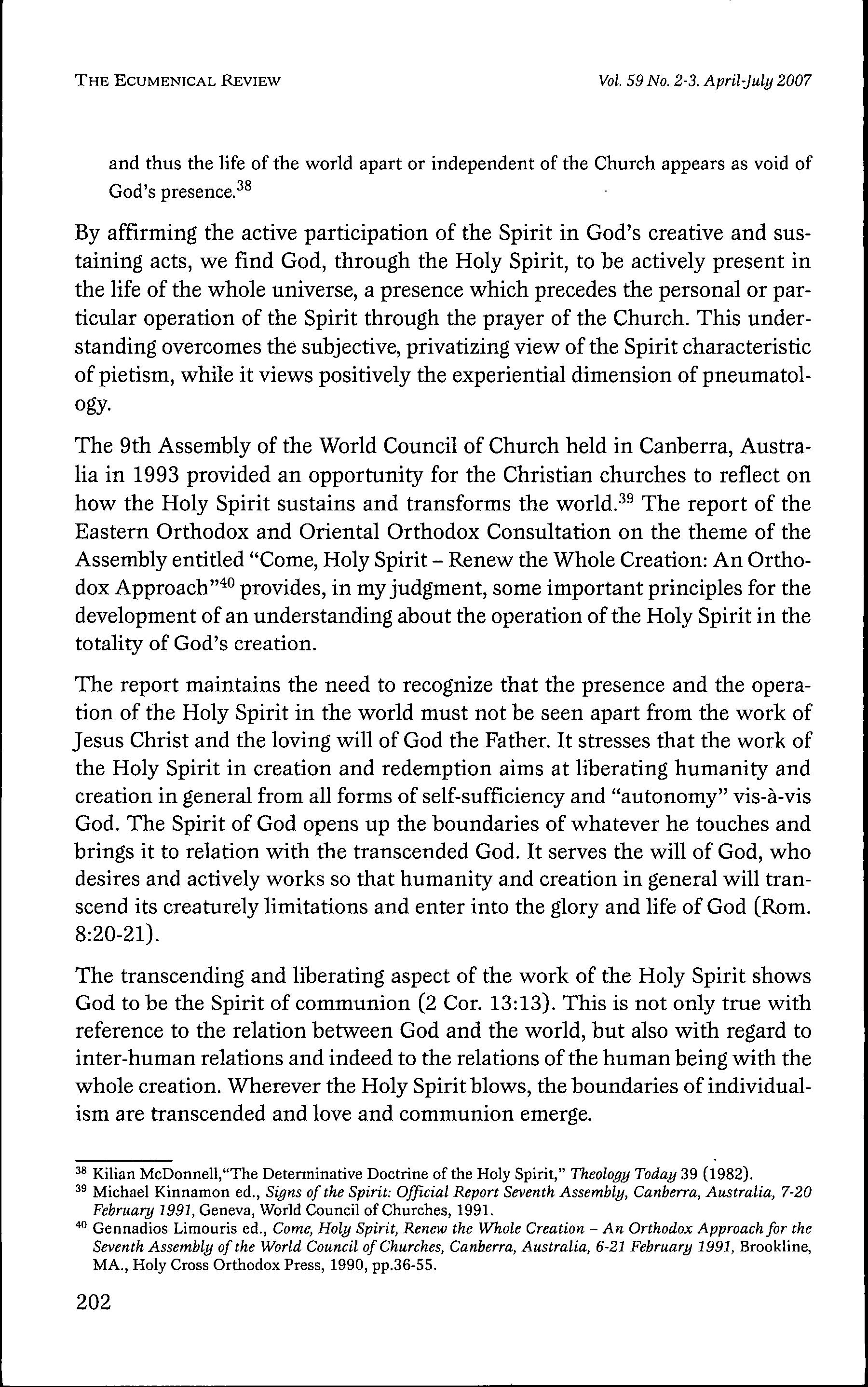
TH E ECUMENICAL REVIEW Vol. 59 No. 2-3. April-July 2007
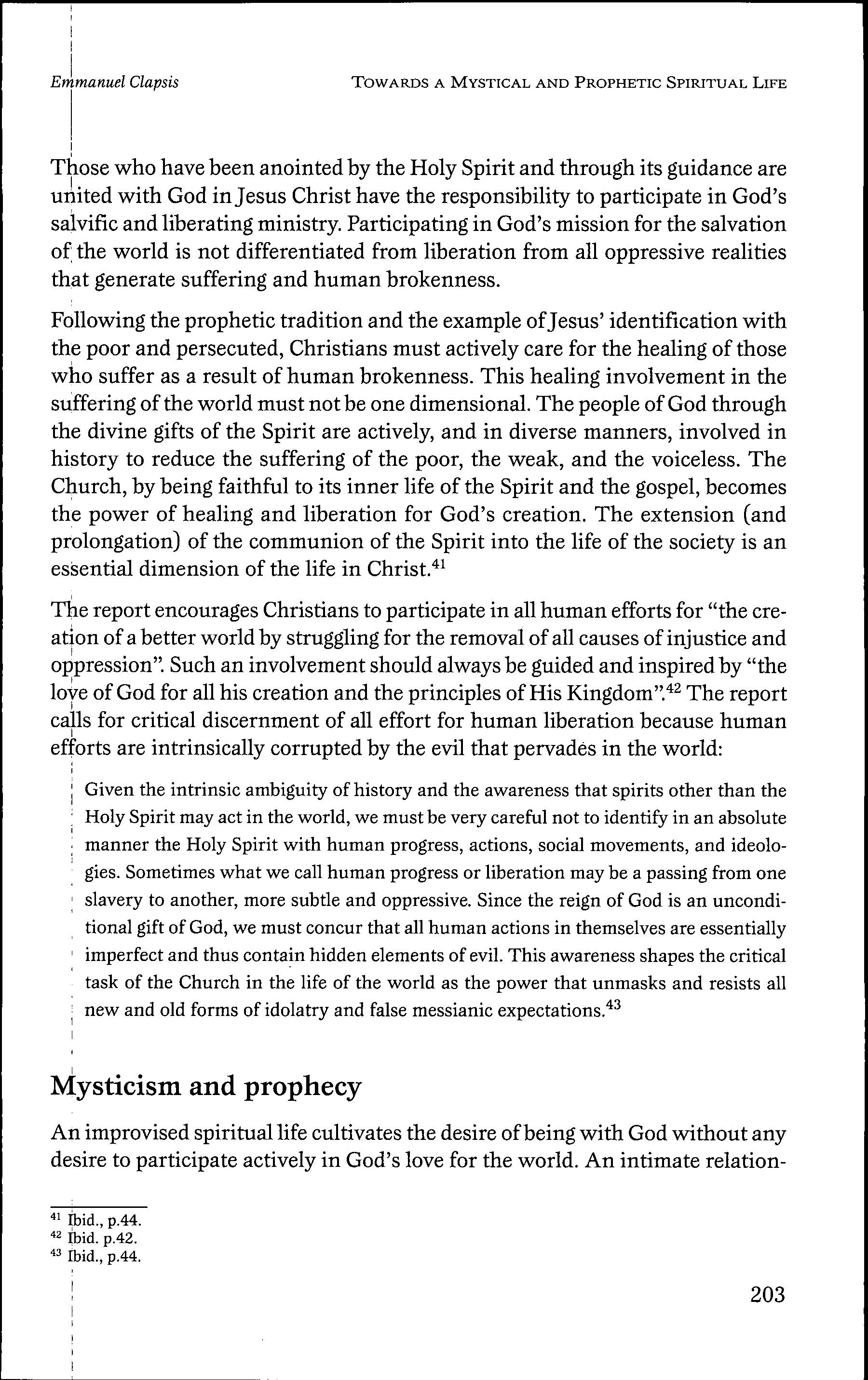
Those who have heen anointed hy the Holy Spirit and through its guidance are united with God in Jesus Christ have the responsihility to participate in God's salvific and liherating ministry. Participating in God's mission for the salvation of the world is not differentiated from liheration from all oppressive realities that generate suffering and human hrokenness.
Following the prophetic tradition and the example ofJesus' identification with the poor and persecuted, Christians must actively care for the healing of those who suffer as a result of human hrokenness. This healing involvement in the suffering of the world must not he one dimensional. The people of God through the divine gifts of the Spirit are actively, and in diverse manners, involved in history to reduce the suffering of the poor, the weak, and the voiceless. The Church, hy heing faithful to its inner life of the Spirit and the gospel, hecomes the power of healing and liheration for God's creation. The extension {and prolongation) of the communion of the Spirit into the life of the society is an essential dimension of the life in Christ.*^
The report encourages Christians to participate in all human efforts for "the creation of a hetter world hy struggling for the removal of all causes of injustice and oppression" Such an involvement should always be guided and inspired hy "the love of God for all his creation and the principles of His Kingdom".*^ The report calls for critical discernment of all effort for human liheration hecause human efforts are intrinsically corrupted hy the evil that pervades in the world:
j Given the intrinsic ambiguity of history and the awareness that spirits other than the ; Holy Spirit may act in the world, we must be very careful not to identify in an absolute ; manner the Holy Spirit with human progress, actions, social movements, and ideologies. Sometimes what we call human progress or liberation may be a passing from one slavery to another, more subtle and oppressive. Since the reign of God is an unconditional gift of God, we must concur that all human actions in themselves are essentially imperfect and thus contain hidden elements of evil. This awareness shapes the critical task of the Church in the life of the world as the power that unmasks and resists all new and old forms of idolatry and false messianic expectations.*''
Mysticism and prophecy
An improvised spiritual life cultivates the desire ofheing with God without any desire to participate actively in God's love for the world. An intimate relation-
Ibid., p.44.
Ibid. p.42.
Ibid., p.44.
Emmanuel Clapsis TOWARDS A MYSTICAL AND PROPHETIC SPIRITUAL LIFE
203
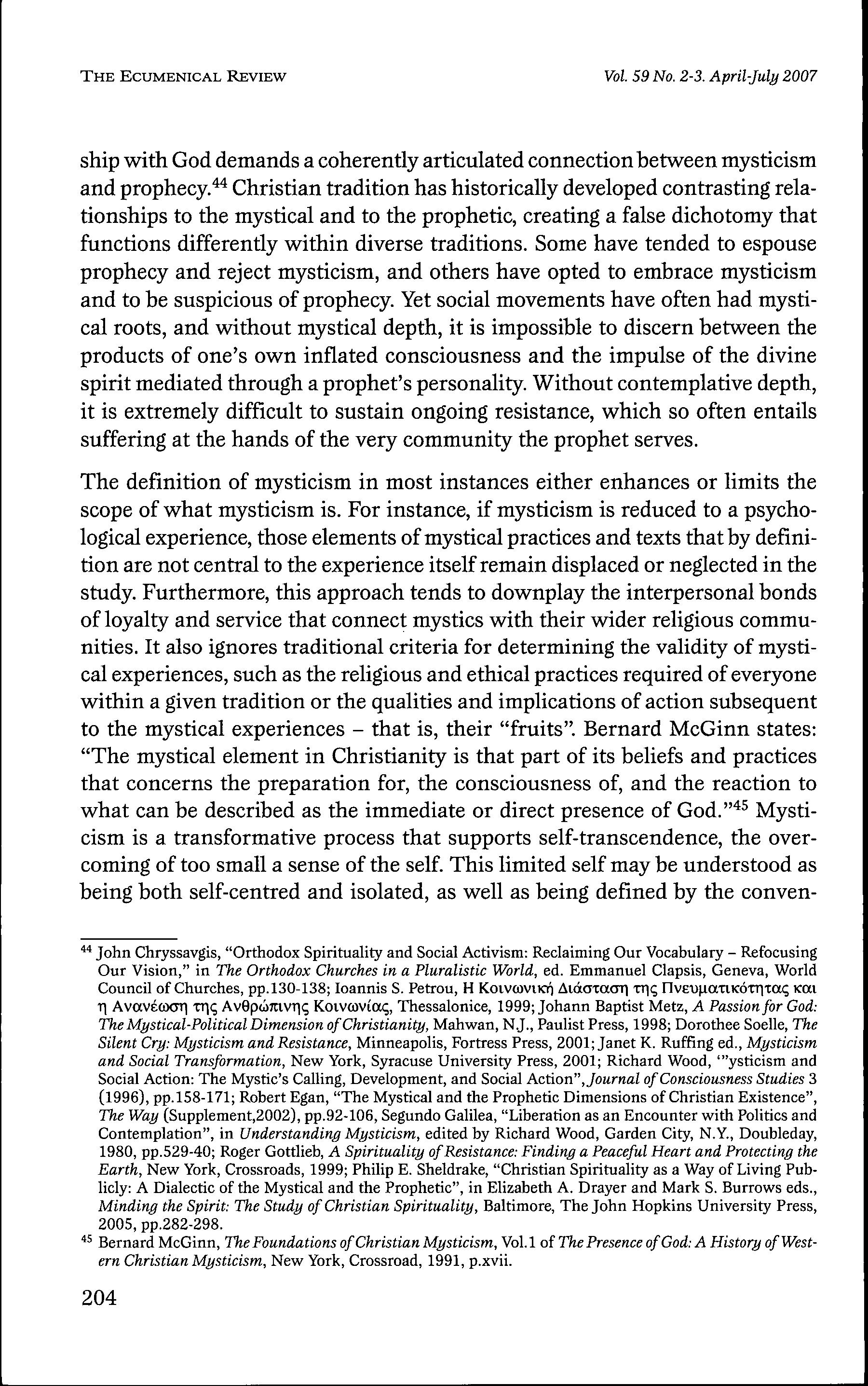
ship with God demands a coherently articulated connection between mysticism and prophecy.^ Christian tradition has historically developed contrasting relationships to the mystical and to the prophetic, creating a false dichotomy that functions differently within diverse traditions. Some have tended to espouse prophecy and reject mysticism, and others have opted to embrace mysticism and to be suspicious of prophecy. Yet social movements have often had mystical roots, and without mystical depth, it is impossible to discern between the products of one's own inflated consciousness and the impulse of the divine spirit mediated through a prophet's personality. Without contemplative depth, it is extremely difficult to sustain ongoing resistance, which so often entails suffering at the hands of the very community the prophet serves.
The definition of mysticism in most instances either enhances or limits the scope of what mysticism is. For instance, if mysticism is reduced to a psychological experience, those elements of mystical practices and texts that by definition are not central to the experience itself remain displaced or neglected in the study. Furthermore, this approach tends to downplay the interpersonal bonds of loyalty and service that connect mystics with their wider religious communities. It also ignores traditional criteria for determining the validity of mystical experiences, such as the religious and ethical practices required of everyone within a given tradition or the qualities and implications of action subsequent to the mystical experiences - that is, their "fruits". Bernard McGinn states: "The mystical element in Christianity is that part of its beliefs and practices that concerns the preparation for, the consciousness of, and the reaction to what can be described as the immediate or direct presence of God."*^ Mysticism is a transformative process that supports self-transcendence, the overcoming of too small a sense of the self. This limited self may be understood as being both self-centred and isolated, as well as being defined by the conven-
'''' John Chryssavgis, "Orthodox SpirituaHty and Social Activism: Reclaiming Our Vocabulary - Refocusing Our Vision," in The Orthodox Churches in a Pluralistic World, ed. Emmanuel Clapsis, Geneva, World Council of Churches, pp.130-138; Ioannis S Petrou, H KoivcoviKn Aidaxacrri rrii; nveunatiKOTritOK; Km Ti AvaveaxTti vr\c, AvQpoiKW^q Koivwvia^, Thessalonice, 1999; Johann Baptist Metz, A Passion for God: The Mystical-Political Dimension ofChristianity, Mahwan, N.J., Paulist Press, 1998; Dorothee Soelle, The Silent Cry: Mysticism and Resistance, Minneapolis, Fortress Press, 2001; Janet K Ruffing ed. Mysticism and Social Transformation, New York, Syracuse University Press, 2001; Richard Wood, '"ysticism and Social Action: The Mystic's Calling, Development, and Social Action", Journal of Consciousness Studies 3 (1996), pp.158-171; Robert Egan, "The Mystical and the Prophetic Dimensions of Christian Existence", The Way (Supplement,2002), pp.92-106, Segundo Galilea, "Liberation as an Encounter with Politics and Contemplation", in Understanding Mysticism, edited by Richard Wood, Garden City, N.Y., Doubleday, 1980, pp.529-40; Roger Gottlieb, A Spirituality ofResistance: Finding a Peaceful Heart and Protecting the Earth, New York, Crossroads, 1999; Philip E Sheldrake, "Christian Spirituality as a Way of Living Publicly: A Dialectic of the Mystical and the Prophetic", in Elizabeth A Drayer and Mark S Burrows eds. Minding the Spirit: The Study of Christian Spirituality, Baltimore, The John Hopkins University Press, 2005, pp.282-298
"•^ Bernard McGinn, The Foundations of Christian Mysticism, Vol. 1 of The Presence ofGod: A History of Western Christian Mysticism, New York, Crossroad, 1991, p.xvii.
TH E ECUMENICAL REVIEW Vol. 59 No. 2-3. April-July 2007
204

tional - a self programmed for a socially determined form of "normality". Mystical consciousness calls into question botb of tbese conceptions of the self. It reveals something more to life. Tbe self discovered in mystical consciousness is a self related to God, a self tbat is more tban tbe self can imagine itself to be anld surely more tban any society conventionally wants it to be.
Propbecy remains a key category for religiously motivated social criticism and directed social cbange. "Yet tbere is not yet anytbing like an adequate bistory ofjpropbecy or propbetic pbenomena tbat can be brougbt to bear on our understanding of tbe mystical traditions, even witb all of their definitional difficulties."^^ Tbe biblical model of the prophet offers a variety of examples of men arid women who enjoyed both friendship and communication with God. In fact, the prophetic task requires friendship with God - an authentic intimacy with God. It is this intimacy with God that eventually overcomes the would-be prpphet's resistance to botb speecb and action, wbich are born of contemplation. How else does one bear God's word spoken in tbe beart or in dreams and visions? How else can one be confident tbat it is God's word and not merely one's own? The mysticism of the prophets is what frees their imaginations and desires from the defining and constraining power of the world as it is, the world as it stands. Walter Brueggemann'*'' describes in detail tbe dynamics of tbis propbetic task. Tbe propbets suffer in tbeir own bearts tbe discrepancy beltween what is and what ought to be. Tbey are somehow unable to maintain tbe "false" consciousness tbat is essential for the perpetuation of unjust social structures that benefit tbose most invested in maintaining tbe status quo. Tbe propbet's criticism is grounded in deeply beld sbared convictions about tbe way, for instance, a Jew ought to bebave and about tbe way tbe community oiigbt to order its life. Tbe prophet is able to convince others only from the perspective of shared memories and norms. The prophet appeals to something the community already knows and wants to value but bas managed to bide from itself or keep separate from tbe domain of its present bebaviour.
The prophet aims to re-energize his/her listeners and helps the community remember its own history, promises and possibilities in a way tbat will inspire cclnversion and fresh resolve. According to Michael Walzer, "Prophecy aims to arpuse remembrance, recognition, indignation, repentance. "^^ It is based on an appeal to tbeir audience's better nature, confronting tbem witb tbe demands of God tbat tbey know (or knew but wisb to ignore or forget). In the end, proph-
Janet K Ruffing ed. Mysticism and Social Transformation, New York, Syracuse University Press, 2001, p.8.
' See his brief classic book: Prophetic Imagination, Minneapolis, Fortress Press, 2001 Michael Walzer, Interpretation and Social Criticism, Cambridge, MA, Harvard University Press, 1987, i,.75.
Emmanuel Clapsis TOWARDS A MYSTICAL AND PROPHETIC SPIRITUAL LIFE
I 20 5
ets deeply trust that their desires and their words will find advocates in the hearts of their own people. Tbe propbetic utterance is at the same time critical of the present and open to a positive appreciation of tbe future tbat envisions the realization of their original calling and covenant. Walzer claims tbat this propbetic pattern of discourse is tbe standard form of social criticism, involving "tbe identification of public pronouncements and respectable opinion as bypocritical, tbe attack upon tbe actual bebavior and institutional arrangements, the search for core values (to which hypocrisy is always a clue), tbe demand of an everyday life in accordance with tbe core. Tbe critic begins with revulsion and ends with affirmation."*^ Gustavo Gutierrez^" suggests tbat tbe prophet both denounces and announces, botb criticizes and engenders bope. But bope emerges not only from limit-situations, but also from positive experiences. Hope arises from experiences ofjoy and gratitude, of solidarity and festival, of love and friendsbip.^^ Tbe propbet works with all of tbese sources of bope, but especially witb tbe process of interpretation and emergence of new meaning - tbe process of re-imagining meaning - wbicb enables both trust in God, witb all tbe struggles tbat may entail, and trust in tbe resources of faitb, wbether in times of darkness or in times of abundant life.

^^ Ibid., p.87.
^^ Gustavo Gutierrez, A Theology o f Liberation: History, Politics, and Salvation, MaryknoU, N.Y., Orbis Books, 1973; idem, We Drink from Our Own Wells: The Spiritual Journey of a People, MaryknoU, N.Y., Orbis, 1988
5' Emmanuel Clapsis, "The Eucharist as a Missionary Event in a Suffering World", in Orthodoxy in Conversation, Geneva/Boston, World Council of Churches/Holy Cross Orthodox Press, 2000, pp 191-97
TH E ECUMENICAL REVIEW Vol. 59 No. 2-3. April-July 2007
206

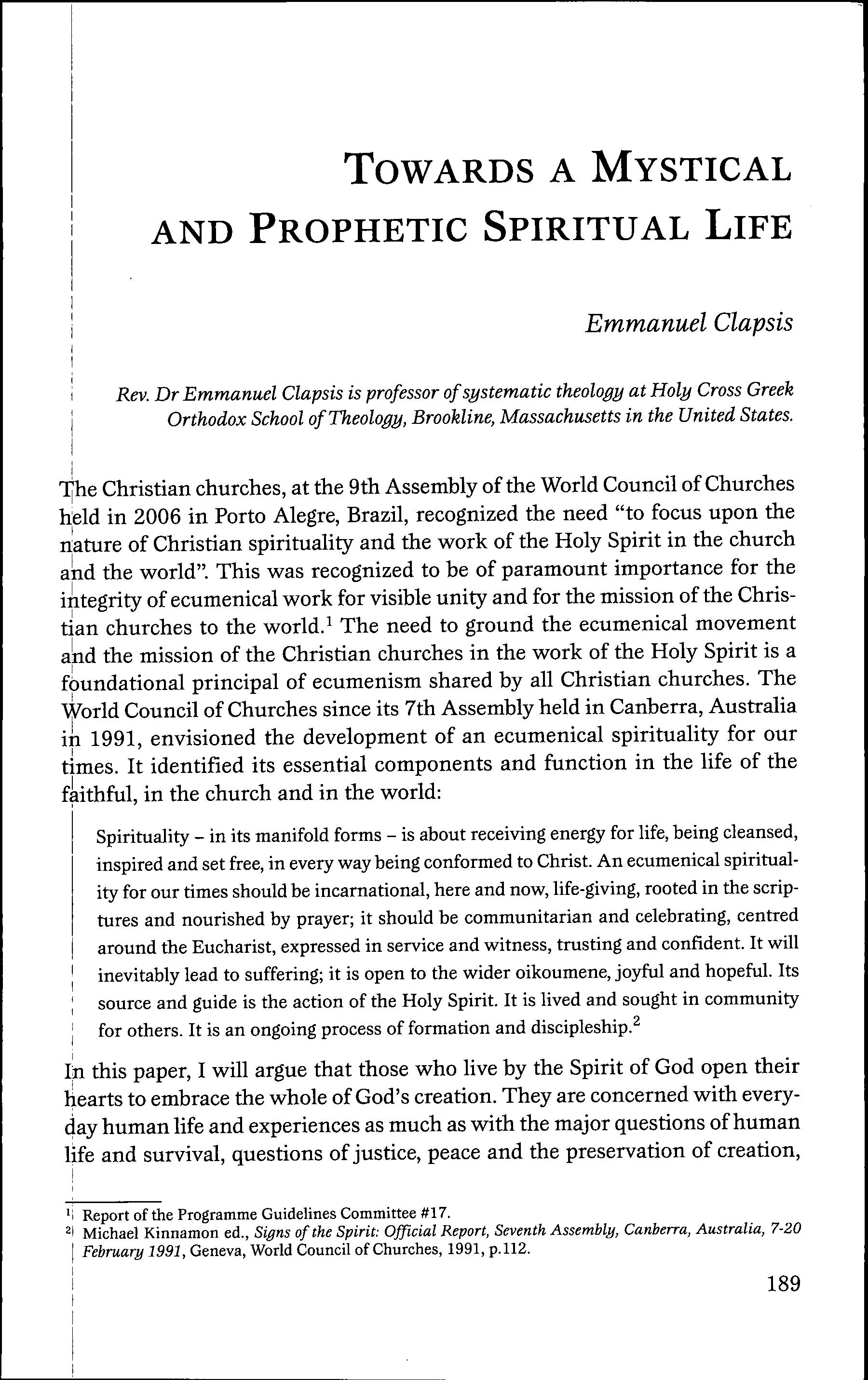 Emmanuel Clapsis
Emmanuel Clapsis
